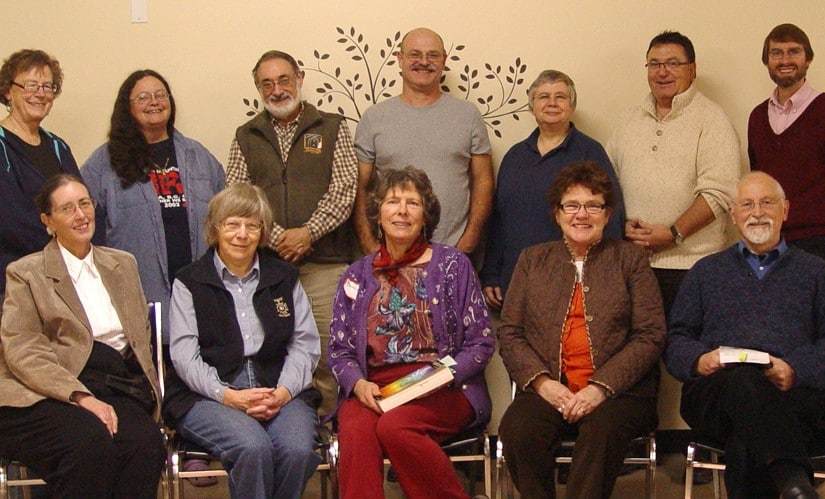The Kootenay School of Ministry (KSM) is a theological training ground like no other. It has no walls, no permanent facilities, migrates around the largely rural Diocese of Kootenay, and enjoys a rotating roster of faculty drawn from across the Canadian church. Eight years ago this school-without-a-school was just a vision emerging from the diocese’s changing ministry needs. Today it is flourishing and a wellspring of hope.
The diocese, which is tucked along the Alberta and American borders in southern British Columbia, has a history of pioneering in ministry. By the time the Kootenay School of Ministry emerged, the diocese was already two generations into the practice of Mutual Ministry, which is designed to help parishes morph from “communities gathered around a minister, toward becoming ministering communities.” This instilled across the diocese a belief that “God has already given us the resources we need,” notes Archbishop John Privett. This belief proved foundational as the communities of Kootenay set out to write its next chapter in innovative ministry practices.
Like many places throughout the Anglican Church of Canada, Kootenay was in a season of evaluation and visioning when Privett arrived in 2005. At this time, he notes, the diocese was in the midst of keen discernment and “looking at existing forms of ministry and what the needs of the future might be.” Kootenay shares with other dioceses the challenges and opportunities of largely rural ministries stretched thin by declining human and financial resources. Many communities in its boundaries are facing realities where they cannot afford traditional full-time stipendiary ministry provided by seminary trained priests.
The Kootenay School of Ministry proved to be the faithful response to this changing ministry environment. A conventional name camouflages the beautiful unconventionality of the school. Without any permanent facilities, the school instead migrates around the diocese and gathers students for short, intensive bursts of learning provided by a range of scholars and ministry practitioners from across the Canadian church. In this way, KSM very clearly lives out a particular understanding of mission: “We go where the people are,” reflects Privett.
The hallmark of the school is the Locally Trained Priests (LTP) programme, where the formation of priests is carried out through a relational and community centered approach within diocesan borders. Students preparing for ministry return to parish settings between courses to integrate their learning in partnership with supervising priests. This balance between class and parish speaks to people who are already “living and breathing congregational ministry,” notes Privett. It also opens the way for people who have long experienced a call to be a deacon or priest but could not take some years away to attend seminary full-time away from home.
This new model of training, which perhaps hearkens early ministries of the church before the professionalization of the clergy, places responsibility for formation in broader context. Education, as per the vision of KSM, is the covenantal undertaking of the whole church—parish, student, and professor.
Faculty is drawn from across the church and bring to the school a commitment to this new vision of ministry. Teachers function as partners in learning to KSM students, many of whom are second-career or adult learners who already have cultivated significant gifts for ministry. Privett says he receives more offers than he can manage from talented scholars and clergy wanting to be part of the teaching ministry at KSM.
Though not quite a decade old, the Kootenay School of Ministry is showing significant early results. Locally Trained Priests are returning to parishes in the diocese with strong, nurturing connections to their communities. Remarkably, the programme and school also led to a parish welcoming its first priest in 35 years.
The future of KSM is bright, if uncertain. Privett looks toward sharing the Kootenay model with other dioceses and communities and securing its financial future. He also sees potential for better dovetailing KSM courses with accredited seminaries, expanding continuing education opportunities for priests in the diocese, and developing mission centres at parishes with seminary trained priests to provide ongoing mentorship. “We believe the Kootenay School of Ministry is too good to be kept in Kootenay,” Privett says, “We would like to see the school become a resource beyond ourselves.”
Whatever the coming years and decades may reveal for KSM, Privett sees nothing but grounds for good Christian hope, “This is a doorway to the future about how we rethink sustaining faithful Eucharistic communities.”
To learn more about the mission and ministries of the Kootenay School of Ministry, please visit www.kootenayschoolofministry.ca.
Interested in keeping up-to-date on news, opinion, events and resources from the Anglican Church of Canada? Sign up for our email alerts .

